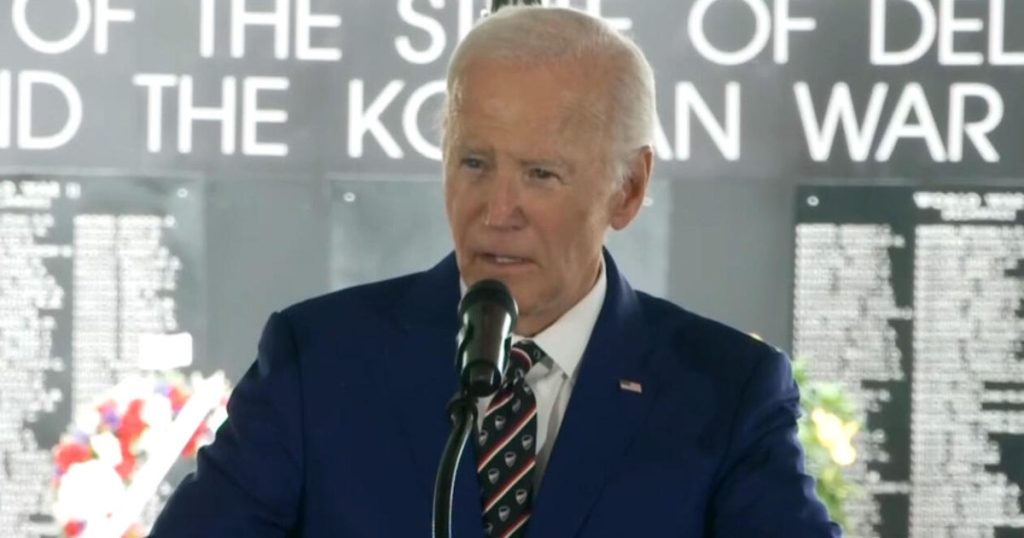Former President Joe Biden recently delivered a poignant speech at a Memorial Day event held on May 30, 2025, marking ten years since the passing of his son, Beau Biden. This event was particularly significant as it was Biden’s first public appearance following the announcement of his diagnosis with an aggressive form of prostate cancer. During his address at Veterans Memorial Park in New Castle, Delaware, which is near his hometown of Wilmington, the 82-year-old reflected on the personal battle he is facing while expressing gratitude for the support from the American public.
| Article Subheadings |
|---|
| 1) Joe Biden’s Diagnosis: An Overview |
| 2) The Significance of Memorial Day |
| 3) Public Reaction and Support |
| 4) Health Screenings and Cancer Awareness |
| 5) Legacy of Beau Biden: Remembering the Past |
Joe Biden’s Diagnosis: An Overview
The recent revelation of Former President Joe Biden‘s health condition shocked many across the nation. Diagnosed with an aggressive form of prostate cancer, Biden’s condition is categorized with a Gleason score of 9, placing him within the most severe stage of the illness. This brutal diagnosis comes with the knowledge that his predecessor and political opponents have often used health issues against him. Biden’s spokesperson has indicated that he first learned of this unsettling diagnosis in mid-May, stating he had not previously been aware of having prostate cancer. Importantly, he did not undergo that screening during his last medical examination while in office back in February 2024. The last prostate-specific antigen (PSA) test, used to screen for prostate cancer, was documented in 2014, raising questions about health management for men over the age of 70.
The Significance of Memorial Day
Memorial Day is a critical date in the American calendar, serving as a day of remembrance for fallen military personnel. In 2025, Biden’s speech resonated significantly as it also marked ten years since the loss of his son, Beau Biden, who passed away from brain cancer in 2015. At the memorial event held at the Veterans Memorial Park in New Castle, Delaware, Biden expressed deep reflections on grief and resilience. He noted, “Cancer touches us all,” reminiscing about his own family’s personal experiences battling cancer over the years. His presence at this Memorial Day service emphasized not just his political role but also the emotional weight of family loss linked to the disease.
Public Reaction and Support
Since the announcement of his diagnosis, the public’s response has been overwhelmingly supportive. His tweet stating, “Like so many of you, Jill and I have learned that we are strongest in the broken places. Thank you for lifting us up with love and support,” exemplifies the empathy shown by the American people. Many citizens have taken to social media to share their thoughts, expressing solidarity and offering personal stories related to cancer experiences. Cancer may be a personal journey, but its broad impact connects individuals across all walks of life. Community support is vital as they latch onto Biden’s experiences; understanding that these human emotions resonate beyond politics.
Health Screenings and Cancer Awareness
Biden’s diagnosis raises significant concerns regarding the importance of regular health screenings, especially as men age. Medical experts advise regular prostate exams, including PSA tests, particularly for men over the age of 50 or those with family histories of prostate cancer. Although screenings can be controversial and are not recommended for all men over 70, they can be vital in uncovering any potential health issues early. Biden’s recent health condition has prompted discussions about men’s health and the necessity of community and familial encouragement for regular check-ups, as proactive awareness may save lives.
Legacy of Beau Biden: Remembering the Past
The shadow of Beau Biden looms over this Memorial Day not only as a remembrance day but also as a personal reflection for Joe Biden. His son, who served as Delaware’s Attorney General, became a symbol of hope and resilience during his battle with brain cancer. The loss has profoundly affected the Biden family and shaped the former president’s policies around health care and cancer research. During his address, Biden shared nostalgic memories while highlighting ongoing efforts to combat cancer through medical research and advocacy, hoping to encourage others who are suffering. As he continues to navigate his cancer diagnosis, the legacy of his son fuels the passion and urgency embedded in his journey.
| No. | Key Points |
|---|---|
| 1 | Biden diagnosed with aggressive prostate cancer, categorized with a Gleason score of 9. |
| 2 | Memorial Day event marks ten years since his son Beau’s death from brain cancer. |
| 3 | Public support for Biden has surged since his diagnosis announcement. |
| 4 | Importance of regular prostate screenings highlighted in the aftermath of Biden’s diagnosis. |
| 5 | Biden carries on Beau’s legacy through advocacy in cancer research and health care. |
Summary
In conclusion, Joe Biden‘s recent diagnosis reveals a deeply personal struggle juxtaposed against a public celebration of remembrance. His candid acknowledgment of cancer’s toll underscores the importance of community support and health awareness. The resonance of his son Beau’s legacy continues to inspire Biden’s advocacy efforts in cancer awareness and treatment. As he faces this challenging health journey, the diverse emotional landscape shared across Americans serves as a powerful reminder of resilience, compassion, and unity.
Frequently Asked Questions
Question: What is prostate cancer?
Prostate cancer is a type of cancer that occurs in the prostate, a small walnut-shaped gland that produces seminal fluid. It is one of the most common types of cancer among men.
Question: How is prostate cancer diagnosed?
Prostate cancer is diagnosed through various methods, including blood tests for prostate-specific antigen (PSA), digital rectal exams (DRE), and biopsies where tissue samples are collected for testing.
Question: What are common treatments for prostate cancer?
Common treatments for prostate cancer include active surveillance, surgery (prostatectomy), radiation therapy, hormone therapy, chemotherapy, and immunotherapy, depending on the cancer’s stage and severity.
